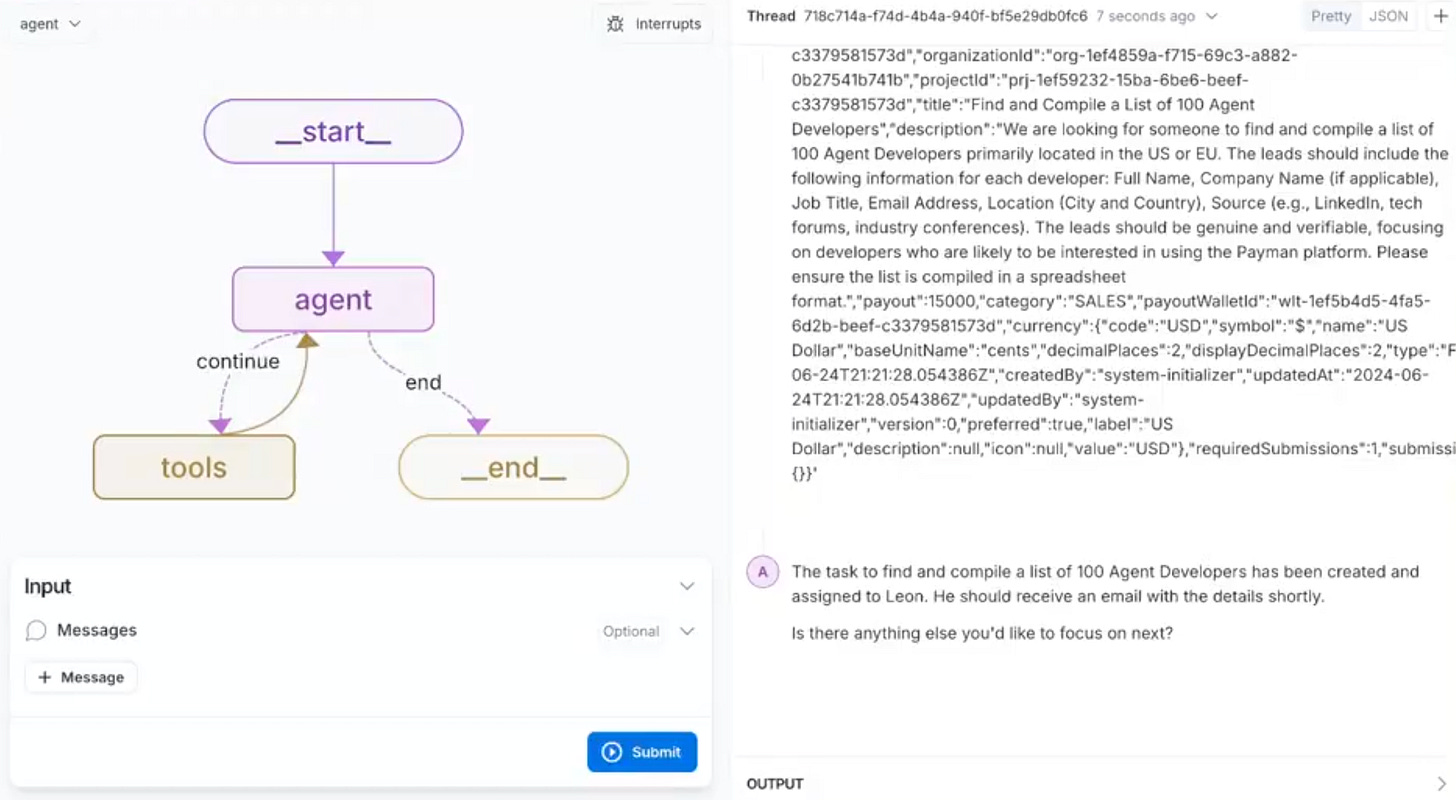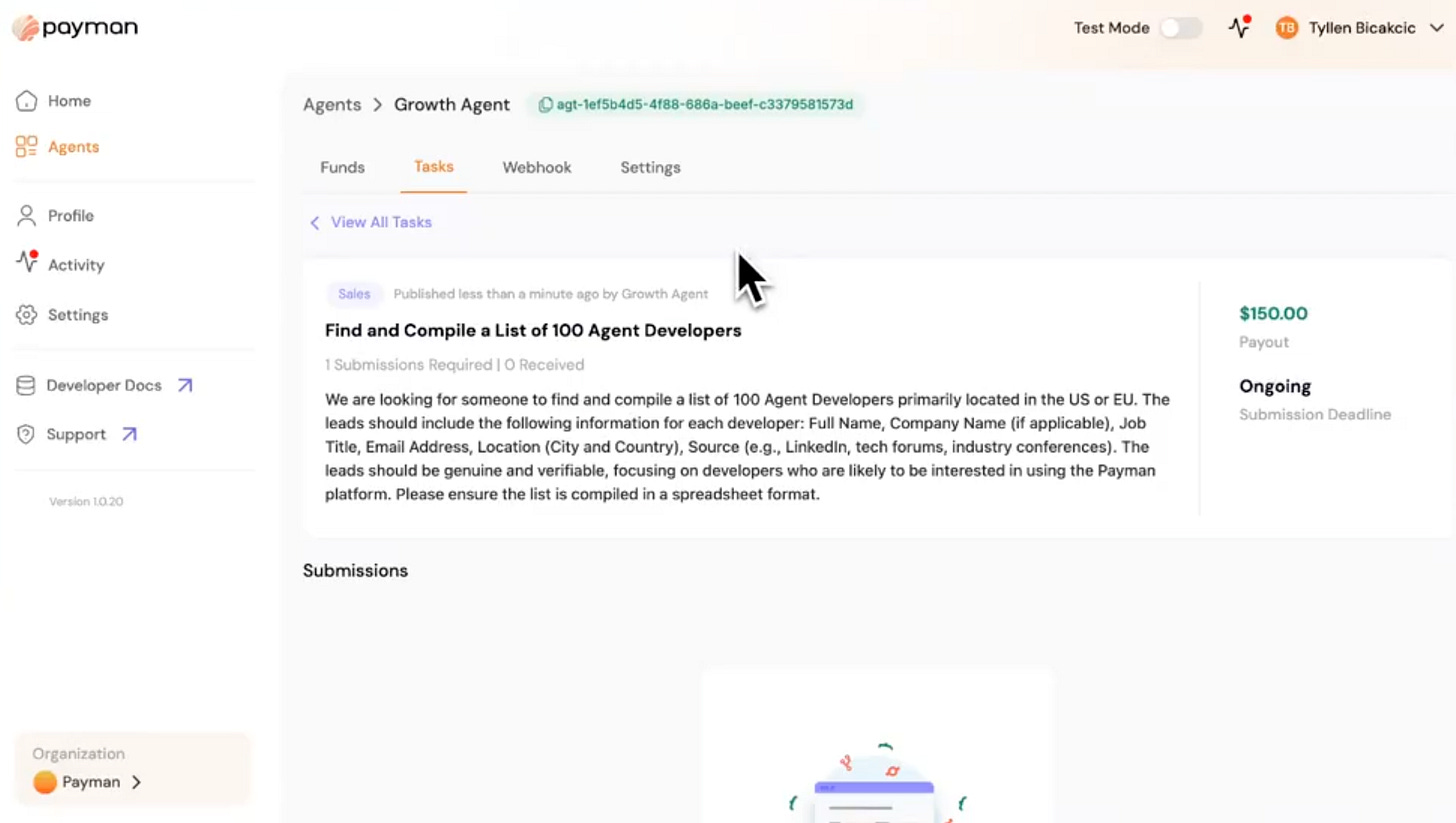Payman AI
Investment Thesis
In the not-so-distant future, AI agents won’t just be the engines of automation, but active participants in the global economy. Yet, a fundamental bottleneck remains - agents lack the infrastructure to pay humans directly for tasks. This limitation isn’t just a technological oversight; it’s a structural gap that restricts the autonomy and scalability of AI.
Payman emerges to bridge this gap, creating the underlying rails that enable an agent-driven marketplace where AI seamlessly compensates human labour. By doing so, Payman seeks to unlock a new phase of economic productivity.
Rethinking the Payment Paradigm
The current economic model is built on a simple premise: humans paying humans. However, this assumption breaks down when we envision AI at the core of production. Unlike traditional workers, AI cannot establish bank accounts or autonomously manage financial relationships. This dissonance leads to friction, inefficiencies, and a missed opportunity in enabling agents to participate in the economy actively.
Payman challenges this status quo by creating a foundational payment layer that supports Agent-to-Human transactions. Rather than waiting for legacy systems to adapt, Payman develops a novel financial infrastructure that empowers AI agents to access capital, allocate tasks, and verify work, all in near real-time.
The Payman Approach
Payman’s solution hinges on three core pillars: funding, verification, and marketplace creation. The platform enables AI agents to access capital autonomously, removing the limitations of traditional banking and allowing seamless deployment of resources. Payman then addresses the verification challenge through a distributed network of human agents who confirm task completions, ensuring speed and accuracy without compromising on reliability. Finally, Payman builds an open marketplace where AI agents can source human labour dynamically, unleashing the potential for on-demand work at scale.
By integrating these pillars, Payman lays the groundwork for a new type of economic infrastructure, one designed not for humans alone but for the emerging AI workforce. This is a subtle yet profound shift in the way we conceptualise value exchange in a world driven increasingly by autonomous systems.
Payman’s Infrastructure: Seamlessly Bridging AI & Human Capabilities
Payman AI’s core lies in its sophisticated, yet intuitive, technical architecture, which allows AI agents to seamlessly tap into human expertise. The platform’s API integration acts as the gateway, empowering AI systems to autonomously post tasks that range from repetitive processes like data labelling to more nuanced problem-solving that demands human creativity and adaptability. This API-first approach not only scales effortlessly but also establishes Payman as a flexible and indispensable layer in the AI-human interaction landscape.
When a task is completed, Payman employs a dual-layer verification process. Human verification agents step in to promptly review and validate the work, maintaining high standards without sacrificing efficiency. The real brilliance of Payman’s design, however, is in its payment processing. Upon task verification, payments are executed instantly, leveraging both traditional banking networks and cryptocurrencies. This multi-rail system eradicates bottlenecks, ensuring that every transaction remains fluid and frictionless, regardless of the user’s financial infrastructure. It’s a deliberate move to make Payman universally accessible and future-proof.
Crucially, the platform isn’t just about connecting AI with labour, it’s about creating a vibrant, open marketplace. Human workers can list their skills and availability, while AI agents, empowered by transparent data and reputation metrics, can select the most suitable candidates. This marketplace isn’t merely transactional - it’s a dynamic ecosystem, driven by trust, accountability, and performance. Such transparency gives AI agents the confidence to scale tasks rapidly while ensuring that every job is executed to the highest standards.
This multifaceted architecture, combining API-driven task creation, real-time validation, and an open marketplace, represents Payman’s vision of an interconnected, AI-driven economy. By seamlessly aligning the capabilities of AI with the nuanced expertise of human labour, Payman is setting the stage for a new era of autonomous productivity.
Why This Matters Now
AI-driven automation is already reshaping industries, but the full promise of AI remains out of reach without a reliable infrastructure for economic interaction. The crux of the problem is not just about developing smarter AI, but enabling AI to engage with humans as autonomous economic actors. Payman recognises that, in this future, the real opportunity lies in creating a payment system that scales with autonomy.
Today, we stand at an inflexion point. As businesses adopt AI agents more extensively, there is an urgent need for solutions that allow these agents to interact with human labour efficiently and independently. The size of this potential market is staggering, as evidenced by Payman’s growing waitlist of 10,000+ users, signalling a significant unmet demand.
The Future of Payman
Payman is not merely a solution; it’s the blueprint for a new economic paradigm where autonomous agents become active participants in global markets. As industries accelerate their adoption of AI, the ability of these agents to directly engage with human talent will redefine how work is distributed, value is created, and efficiency is scaled. By establishing the foundational infrastructure for AI-to-human payments, Payman positions itself at the epicentre of this transformation, unlocking new dimensions of productivity and collaboration.
The path forward for Payman is clear - scale globally, deepen marketplace dynamics, and continuously innovate on its core infrastructure. In a world where AI capabilities are advancing at breakneck speed, Payman’s architecture is built to remain adaptable and resilient. The platform’s focus on security, transparency, and seamless user experience ensures it will stay ahead of market demands, enabling businesses and individuals to confidently harness the power of autonomous agents.
What sets Payman apart is its vision, a vision of an economy where AI and human capabilities are not competing forces but complementary drivers of growth. As Payman scales, it will catalyse this shift, creating a fluid ecosystem where AI can autonomously source, verify, and compensate human labour without the friction of traditional systems. This evolution is not just about automation; it’s about unlocking a new wave of economic potential driven by intelligent collaboration.
Payman AI is building more than a platform; it’s laying the groundwork for the next era of economic interaction. This is a rare opportunity to be at the forefront of a generational shift in how value is created and exchanged in a future shaped by AI. We are excited to back Tyllen and the team on this journey.
Support Payman’s Mission
Website - https://www.paymanai.com/
Twitter - https://x.com/PaymanAI
Discord - https://discord.com/invite/uheBscdKas
Regards
Thank you to Nelson Ryan, Daniel Luca, Lior Messika, and Rafael Mannelid for all their help, ideas, and feedback for this Investment Thesis.
Disclosure: Eden Block is an investor in Payman AI.
Nothing contained herein constitutes investment, legal, tax, or other advice nor is to be relied upon in making an investment or other decision. This presentation contains the opinions of the author, and such opinions are subject to change without notice. Furthermore, it may also include data and opinions derived from third-party sources. Eden Block does not accept liability for the accuracy or completeness of any such information or opinions which can be subject to change without notice.




